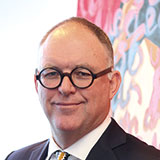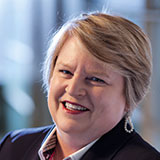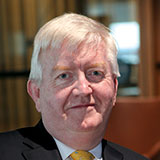The power of mentoring relationships can pass through generations. Mentoring relationships, as either the mentor or mentee, are about the most satisfying relationships you can have in professional life.
Managing some of the country’s largest law firms comes with many challenges and requires leaders at the top of their game. Four legal eagles who have acquired wisdom on their roads to success, speak candidly and share their powerful experiences.
The power of a good mentor
Michael Rose, Chief Executive Partner, Allens
 When I first arrived at Allens as a summer clerk in 1983, I looked around and saw lots of examples of the career I would like to have. I saw people who were good at what they did and who were having fun doing it. I decided to work as closely as I could with those people and to make them my mentors.
When I first arrived at Allens as a summer clerk in 1983, I looked around and saw lots of examples of the career I would like to have. I saw people who were good at what they did and who were having fun doing it. I decided to work as closely as I could with those people and to make them my mentors.
In the early years of my career, I was extraordinarily lucky to find some remarkable mentors who had a big impact not only on my professional development but on many other aspects of my life as well. Some of these people are still important mentors for me and I value their guidance and judgment very much.
The power of mentoring relationships can pass through generations. One of my mentors retired from the Allens partnership recently. In his farewell speech he spoke about the lessons he had learnt from his mentors. I pointed out that I had learnt those same lessons from him, and a younger partner who was there mentioned that she had learnt them from me.
When I first became involved in leadership at Allens I very deliberately looked for mentors outside the firm who could help me develop my thinking around leadership and test my ideas. Most of these mentors were in organisations very different to Allens and I found the breadth and diversity of their experience helpful in honing my own leadership style.
When Allens introduced its Reconciliation Action Plan and began to increase its engagement with Indigenous communities and organisations, I sought out people who could become strong mentors for me in this space as well.
I began by looking for people who could help me develop a better cultural and political understanding of the key issues facing communities. My mentors in this area have helped me develop this understanding and have once again provided me with extraordinary examples of leadership. I am in awe of some of the leaders in this space and I have tried to cultivate some of the courage and wisdom of these leaders.
None of these mentoring relationships have been formal or structured, but all of them have been powerful. Having received so much from mentors throughout my career, I have tried to be a good mentor for others at different stages of their careers. In my mind, mentoring relationships, as either the mentor or the mentee, are about the most satisfying relationships you can have in professional life.
As I get ready to finish my final term as Chief Executive Partner at Allens, I have been staying close to another group of mentors – this time men and women who I think have made great transitions in their careers. I have been speaking with them about the choices they have made and the unexpected challenges and pleasures they have discovered. In a way, I am still where I started, looking at people who are good at what they do and are enjoying it. Staying close to people like this has always worked for me.
 Michael Rose
Michael Rose
The power of positivity
Mary Padbury, global vice Chairman, Ashurst Australia
 I was born in Perth and my dad worked for a company that meant we moved to Melbourne, back to Perth, then Adelaide, then Melbourne. So I grew up across the southern states, and I went to law school in Melbourne.
I was born in Perth and my dad worked for a company that meant we moved to Melbourne, back to Perth, then Adelaide, then Melbourne. So I grew up across the southern states, and I went to law school in Melbourne.
When you’re a small child you don’t know any better – you follow your parents, otherwise you’re not quite sure where you will live. But there is probably a correlation between that sort of experience and the extent of your adaptability as an adult. I sometimes say to my colleagues when we’re discussing a potential move to other countries or offices that it is not necessarily a bad thing if you go and work in a different state or a different office – particularly if you’re able to do that on an international basis with different people. It does broaden your horizons and probably means that later in life you will be a bit more adaptable.
Lawyers, by nature, are trained to be risk averse, critical, and to always think of the things that can go wrong. Therefore, it’s important if you’re in a leadership role in a law firm to also imagine and highlight what can go right and how the world can be better or different. Being positive is a good antidote to the general professional training of lawyers.
My brother, an anaesthetist, committed suicide when he was 50. That was a really sad event. He took his own life and left his wife and three children, the youngest of whom was a teenager. I was fortunate that the firm was very supportive and I had a lot of support from friends, colleagues and family. I was very lucky.
That is an example of something that’s genuinely tragic that forced me to reflect and to put work into perspective. Often people will come and say, “This terrible thing has happened at work and it’s a calamity.” Having that added perspective enables you to think, “It’s not a tragedy. It isn’t actually so terrible, we can fix it, we can work our way around it.”
Everyone has genuinely sad or difficult things happen in their personal life. So in contrast, when you come to work, it should be a generally positive and enjoyable experience. At times you have to work very hard and at times it can be difficult, but your mindset should be that work is generally positive. If it isn’t positive you are in the wrong job.
I personally feel I am bovinely optimistic, that’s my natural setting. No doubt on occasion it gets me into trouble, but it has been a good thing for being involved in the leadership of the firm. If you’re optimistic about the industry, and ready or willing to change and adapt, it makes things easier.
I’m notorious for laughing at my own jokes, because somebody has to. I don’t know any other way. If I look back on my career, the things I have enjoyed most are working with a team of people – in my case usually in litigation. The most enjoyable times have been late at night, with counsel or colleagues being silly and not taking life too seriously.
I can think of one case that involved shrink wrap, used for packaging of meat products. Apparently, some of the tipstaff at the Federal Court Registry voted it the most boring case of that year.
I remember working quite hard, as you do when getting cross-examination questions ready and so on. I did manage to nod off while our silk was addressing the court and I woke up to see a Post It note in front of me. In Melbourne, of course, you sit with your back to the judge. The note said, “If you must fall asleep, please only do so while my opponent is speaking.”
Another funny thing that happened on that case was when counsel and I were out looking up some books in the library outside his chambers. We came back to find our Japanese clients, one of whom had his wig on and the other taking a photo, killing themselves laughing. Our clients found the wigs pretty funny.
Being easy going, relatable and down to earth is very much part of the Australian ethos. I think law firms should be very flat organisations, not hierarchical, and it’s important that you should be able to get on with everyone. I believe in distributed leadership. Law firms are large organisations with lots of different challenges and you need an array of skills to meet those challenges. You need a team. No one person is going to have all of those skills.
I started practice when I joined as an articled clerk in 1981. All of the partners could sit around a large table, and now we’re in a firm with more than 400 partners in 16 countries with 28 offices.
That is an extraordinary transformation. A lot of people have been involved in our evolution, with both state-based mergers and international mergers. It’s an example of collective positive thinking.
 Mary Padbury
Mary Padbury
Everyone has genuinely sad or difficult things in their personal life. So in contrast, when you come to work, your mindset should be that work is generally positive. If it isn’t, you are in the wrong job.
The power of thinking outside the square
Tony Harrington, Chief Executive, Minter Ellison
 Thinking outside the square, being unconventional and challenging assumptions about how things should be done are themes that have accompanied me all my life – perhaps that’s not such a surprising statement coming from a redhead. My parents migrated here in 1960 from Dublin when they were both in their mid-40s with three boys under 12. The dream was to find new opportunity and build a better life for the whole family.
Thinking outside the square, being unconventional and challenging assumptions about how things should be done are themes that have accompanied me all my life – perhaps that’s not such a surprising statement coming from a redhead. My parents migrated here in 1960 from Dublin when they were both in their mid-40s with three boys under 12. The dream was to find new opportunity and build a better life for the whole family.
It would have been a lot easier for them to stay in Ireland, with family and friends. Dad was a skilled carpenter who had worked most of his life as a shipwright, including a stint in South Africa working for the British Navy.
Soon after arriving in Australia we found ourselves growing up in the western suburbs of Sydney, in Bulldogs heartland, and I attended De La Salle College in Bankstown. Dad started life in Australia working in the building industry and jumped at the opportunity to apply his talent in a different way working on the Sydney Opera House for 10 years. At the time, skilled craftsman were in demand and today, if you look at the smooth concrete on the internal facades and the wonderful timberwork in the Opera House, it retains all the hallmarks of true craftsmanship.
The fact that my dad was prepared to take a considerable risk by moving half-way round the world in the ‘60s and applying his skills in a different way has always really inspired me. During my years as Senior Partner at PwC, we held every new partner admission dinner at Bennelong Restaurant in the Opera House. Nobody knew it at the time but, in my own way, I was connecting my own experience building a business with my father’s legacy.
In my early 20s, when I was at Coopers & Lybrand, I was asked to build a tax practice in Chatswood. There were no other tax people there and all my colleagues at the time said, “You are mad. You have to be in the city if you want to progress your career.” I saw things differently. For me it was an opportunity to build something new by getting closer to clients. My time at Chatswood taught me the importance of being a self-starter, challenging the status quo, and always being respectful of and listening to your clients.
When I joined Minter Ellison in the middle of last year, we dropped the word “lawyers” from our brand and set ourselves the goal of being “our clients’ best partner”. I often get asked why we dropped the word “lawyers”. Simply, because it’s not all about us. It’s not about our technical excellence, which, frankly, should be a given. We did it because we want to create an exceptional experience for clients such that they see us as a partner in their business, creating value and providing solutions to the challenges they face.
In many ways, joining Minter Ellison has been a “coming home” experience for me. Minter Ellison has an enormous breadth of expertise, capability and client relationships that reminds me of my early entrepreneurial days at Coopers & Lybrand. Its preparedness to challenge itself and think outside the square – evidenced by my appointment as Chief Executive – is unusual in a profession where this role tends to be held by an insider. The assumption that only a lawyer could hold this role runs deep in the legal profession. I’d love to have a dollar from everyone over the past year, from outside the firm, who has said to me, “Tony, I didn’t know you had a law degree.”
If I would say one thing to young lawyers it’s that whatever you do, bring all of yourself to work and challenge the status quo. The world is moving at a fast pace. How young people interact with clients is key. What the profession needs is real people – people who bring a level of creativity and innovation. You have to have interpersonal skills and a collaborative approach so you can listen effectively to what your clients are after.
The trap for a lot of professionals is they go into a meeting thinking they have to have the answers. That creates barriers to getting to the right outcome. If you go in with a preconceived answer, you are going to hear only the things that relate to the answer you have brought to the table.
There is some truth to the story that two minds are better than one, and three minds are better than two. One thing I’ve learned over the years is that it’s hard to be an “out-of-the-box” thinker without being a good listener.
 Tony Harrington
Tony Harrington
If I would say one thing to young lawyers it’s that whatever you do, bring all of yourself to work and challenge the status quo. The world is moving at a fast pace. How young people interact with clients is key.
The power of diversity
Sue Kench , Managing Partner, Australia, King & Wood Mallesons
 I come from a family of four children and I’m a twin, so from very early on diversity became important to me. We are identical twins, so I felt I had to create my own identity and be conscious of that. Growing up I always tried to be a little different and excel in different ways.
I come from a family of four children and I’m a twin, so from very early on diversity became important to me. We are identical twins, so I felt I had to create my own identity and be conscious of that. Growing up I always tried to be a little different and excel in different ways.
My mother was a very clever woman. When she was growing up, her father was a lawyer. In fact, law had been right through my mother’s family – they had all been lawyers, judges and so on. But my mother was not. It was absolutely not permitted in her family for her to do law, because back then her parents were very conservative and felt that it was a profession that women did not go into.
In a family of three girls and one brother, we were never aware of any gender bias or issues. I went to Abbotsleigh and the school was always about encouraging girls to do their best and succeed.
I was brought up to come at everything with an open mind and sense of inclusiveness. That was the environment that bubbled around me as I started my career in law. I guess I was luckier than my mother. I was lucky, I worked hard, and I never felt left out of the “boys club”.
I’m not a fan of quotas. I’m just not a fan of, “I say this and so therefore”. It’s more a case of empowering people – creating an environment in which people come to work and feel they can and want to do their best work. If gender is not an issue, for example, you let the environment itself create diversity.
I’ve been very lucky in the firms I have worked for. Maybe I picked them and they picked me, but gender has never been an issue. However, it is an issue for many women and action is required to level the playing field. Firms need to help women push out their networks. That makes me say, therefore, it should never be an issue for anybody else.
When it comes to being flexible with working arrangements, ultimately you have to realise your firm is a workplace of highly skilled professionals. It’s the outcomes you need to focus on, not the process of how the work gets done. Those highly skilled professionals can decide where they work best. Provided they understand it is also about a collaborative environment and they do need to come together from time to time.
I have three children aged 13, 11 and nine. Whereas before children I would be at my desk at a quarter past seven in the morning, when I had my third child I came to the realisation that quarter past seven was not going to be a happening thing. Nowadays, morning times during the week are special. Luckily, that coincided with new technology, when I had a bit of an “aha” moment and realised that, actually, my clients could just ring me on the phone. I don’t have to be sitting at the desk.
Diversity is about an open and inclusive workplace, and that cuts across all sorts of things. It’s not just about gender. It’s about age, race, culture, sexual orientation.
Diversity encourages creativity, enterprise and ways of solving problems that you cannot find in a closed network of ideas. I think of diversity as a subset of what we’re trying to do more generally in the firm and what needs to be done in the law. Essentially, break down the traditional sense of hierarchy and make firms more open and inclusive.
We do blind recruitment when looking at CVs and recruiting graduate law students. To the person reading the CV, gender is not known, name unknown, school unknown, everything is blanked out. The partners and lawyers involved on the recruitment committee are trained in unconscious bias.
They read the CVs completely blind and look basically to academics but, having said that, if you get 100 per cent in your exams it does not necessarily mean you will get a good read. We also look for broader experience, because we’ve found that if you’ve got broad experience, worldly experience, it encourages growth of different perspectives.
As for the gender piece – I still don’t know how to crack it. More than 50 per cent of our graduates are women, more than 50 per cent of associates are women. Partnerships are probably 26 per cent. But are we perfect? Absolutely not. Is there much more we can do? Yes. Have I got the answer as to what it is? No. But will I keep looking? Yes.
 Sue Kench
Sue Kench
Diversity encourages creativity, enterprise and ways of solving problems that you cannot find in a closed network of ideas.
Photography: Jason McCormack




